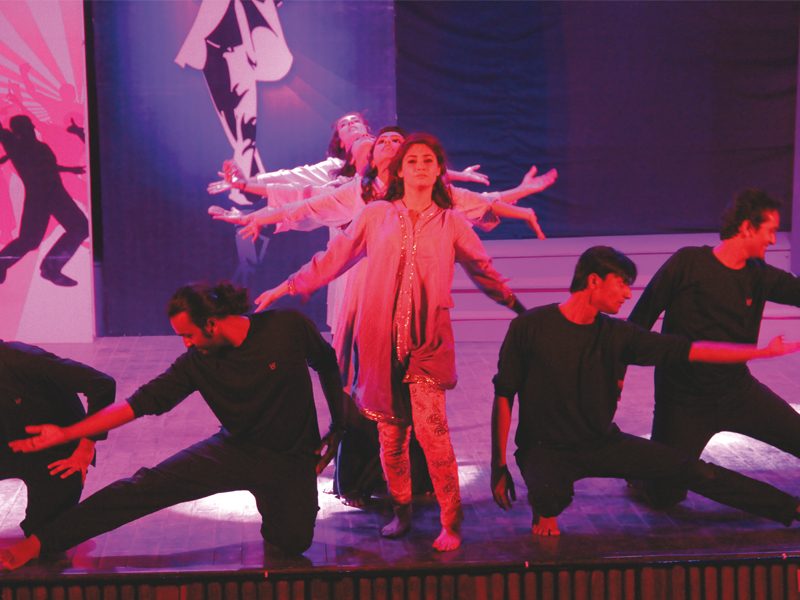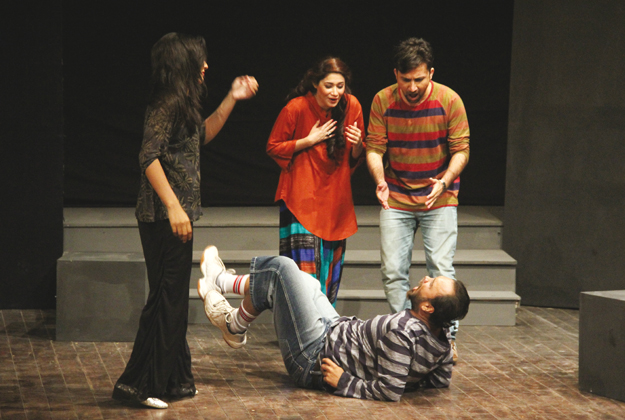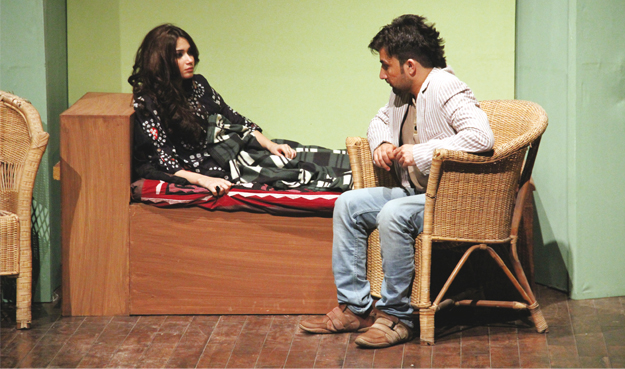
Our negligence towards the underprivileged communities in this country borders on the criminal. While greater attention — but by no means enough — has been given to persecuted religious minorities, the poorer class’ restriction of movement as a result of hefty entrance fees to public parks and recreational areas makes it even more difficult to call this city one’s own. The more obvious and shameful restriction to a freedom of movement however, has been towards the physically challenged. Cinemas and restaurants aside, public institutions like buses, schools, courts and even hospitals are inaccessible to people on wheelchairs and crutches. Inarguably, more needs to be done to facilitate the physically challenged, and more people need to be made aware.
It is for this reason alone that Junoon, a play by Show You Care (SYC) an NGO that advocates for broader wheelchair accessibility in public buildings, is worth watching. It is a valiant, innovative and necessary effort to mobilise society towards caring for the physically challenged. Keeping this in mind, one also has a moral obligation to go see this play, not simply an aesthetic one.

The play is worth watching for its efforts to mobilise society towards caring for the physically challenged. PHOTOS: AYESHA MIR/EXPRESS
The plot is straightforward — an ambitious, talented dancer Annie (Shameen Khan) has her life altered after an accident which puts her in a wheelchair permanently. Initially, the plot stalls and meanders unnecessarily until Annie has her accident in an anti-climactic scene. Rather than feel shock or concern, one can only breathe a sigh of relief at the accident, knowing that now the plot would finally move forward.
Distraught and disillusioned, Annie becomes a recluse until a budding friendship with another physically challenged woman, realistically wheelchair-bound producer Farhat Rasheed, inspires her to dream again.
Amateur voice projection and futile attempts at slapstick comedy are misplaced because they distract the audience from the theme in question. The same applies to the status of the play as a ‘musical.’ An assumption on the part of the director that the sobering realisation that the physically challenged have not been granted their rights isn’t enough to keep the audience in their seats (it is), but instead, some Bollywood masala might do the trick (it doesn’t), the audience is subjected to breaks between hard-to-hear dialogues by dance numbers that don’t have anything to do with the play.
The play, and everything about it, does pick up after the accident. Once the distractions of the banter are taken away the acting gets better, and so does the script. Farhat’s own appearance is quite moving, and despite its faults, the play and what it stands for does shine through in the end.
Anwar Maqsood, a special guest and patron of the play, said as much when he recommended that Annie ought to have broken her leg during the first dance number. As the theme of the play is powerful enough, the speeches and videos shown before and after the play seem excessive. To its credit, SYC employed subtle ways to highlight its cause — rather than the usual host of VIPs, the reserved seats were occupied by physically challenged people and their families.

The play is worth watching for its efforts to mobilise society towards caring for the physically challenged. PHOTOS: AYESHA MIR/EXPRESS
The aesthetic has (unnecessarily) been sacrificed for the moral, but the moral is important enough to make this play a worthwhile watch. Directed by Anjum Ayaz, Junoon is playing at the Arts Council every day at 8pm until November 25.
Published in The Express Tribune, November 25th, 2013.
Like Life & Style on Facebook, follow @ETLifeandStyle on Twitter for the latest in fashion, gossip and entertainment.
COMMENTS (1)
Comments are moderated and generally will be posted if they are on-topic and not abusive.
For more information, please see our Comments FAQ

1721377568-0/BeFunky-collage-(18)1721377568-0-165x106.webp)



1725254039-0/Untitled-design-(24)1725254039-0-270x192.webp)

1732617223-0/Untitled-design-(69)1732617223-0-270x192.webp)

1732603037-0/BeFunk_§_]__-(51)1732603037-0.jpg)
1732610150-0/Untitled-design-(3)1732610150-0-270x192.webp)






Having visited the developed countries, it amazed me to see that, through building and zoning legislation, all buildings are required to have ramps for wheel chair bound people and also special wash rooms that can be accessed by them on every floor. This is regardless of the fact whether any physically challenged individuals actually works in those places.
Many years ago, I had the misfortune to take my mother to Naval Hospital, Islamabad, for treatment. On existing the main entrance, the slope for the wheel chair was so steep that it took 4 people to hold on to the wheel chair to bring it safely down the slope. The slope dropped about 5 feet in a total of 3-4 feet. In fact, if it snowed in Pakistan, the slope could have been used for practising ski jumping.
If that is the condition of our supposedly "planned" hospitals, then why am I not surprised at the other places.